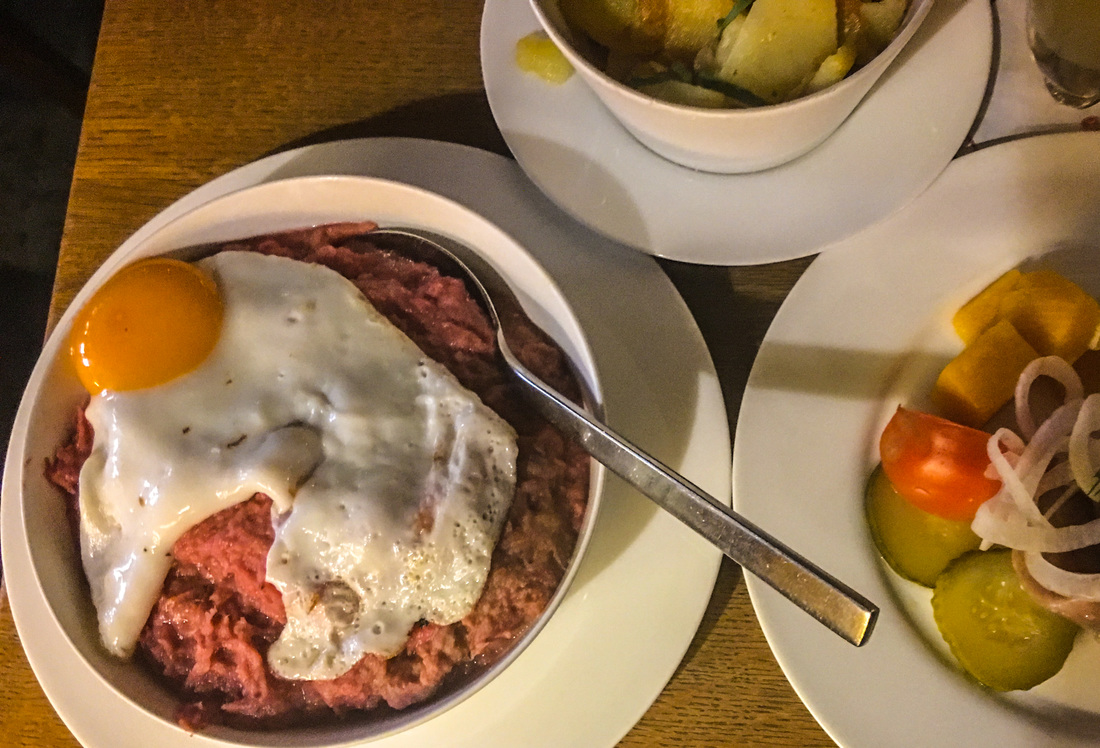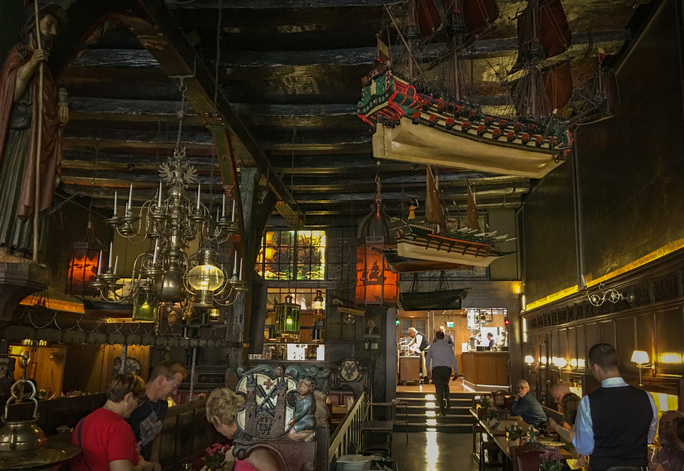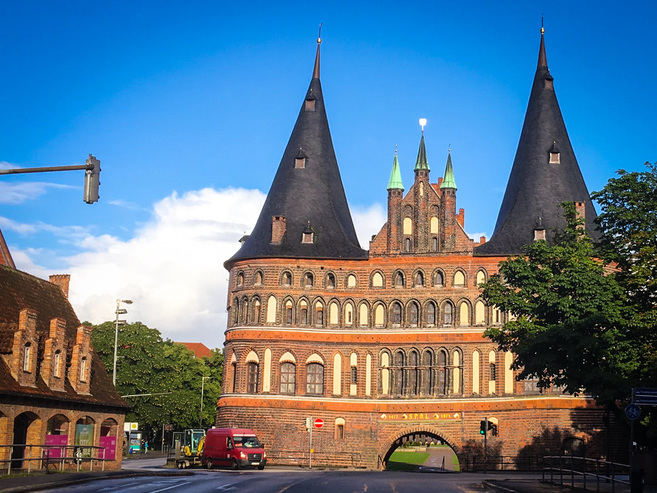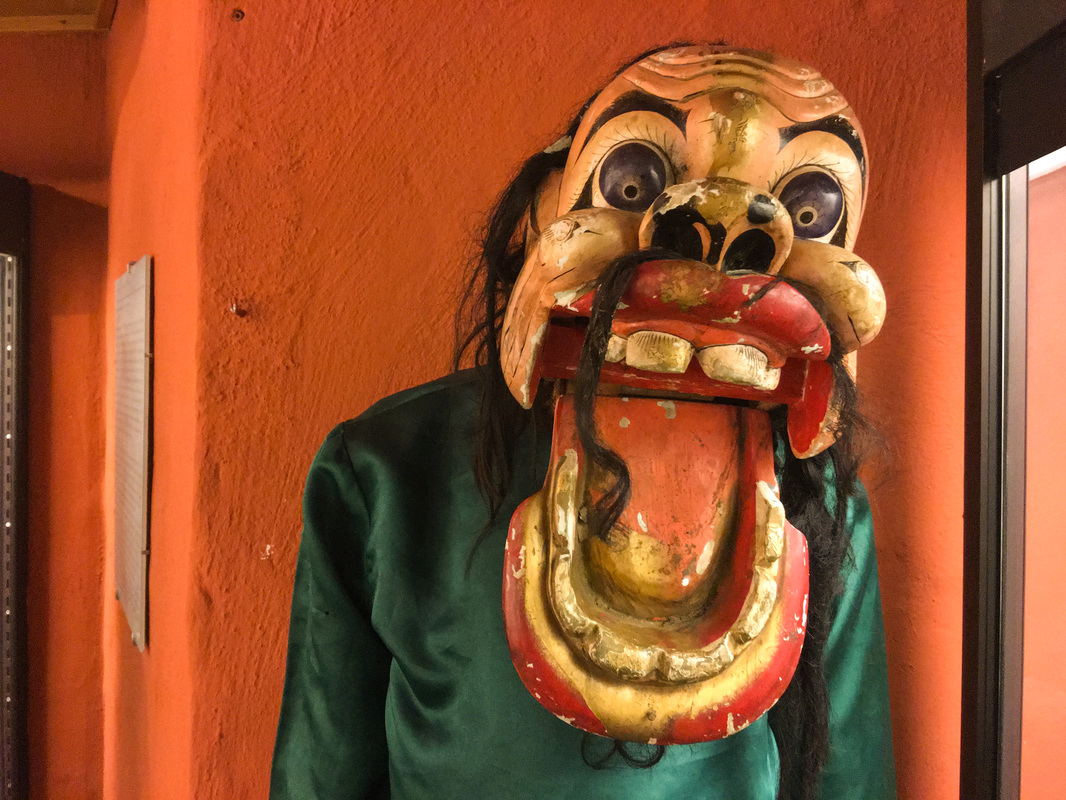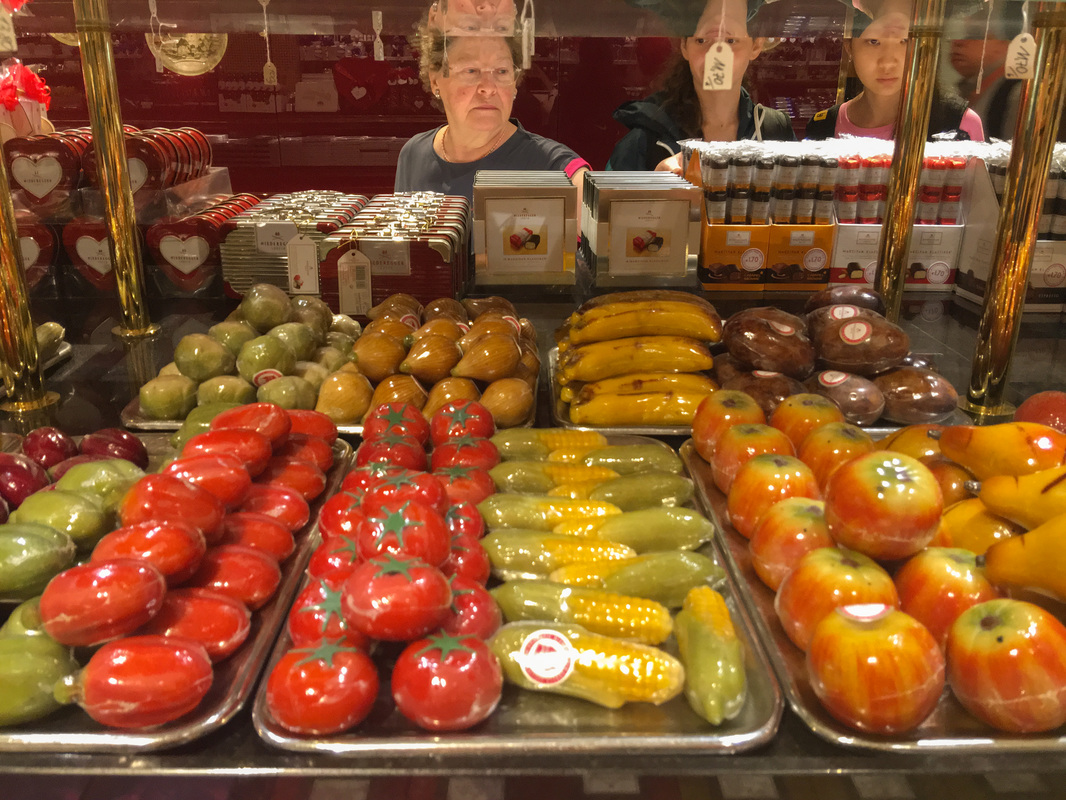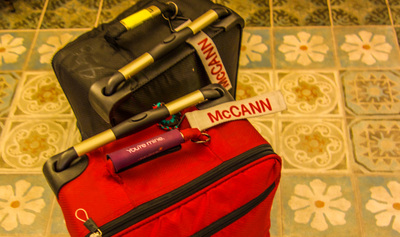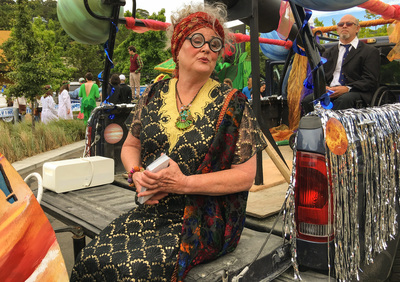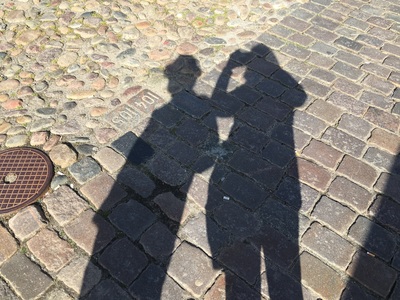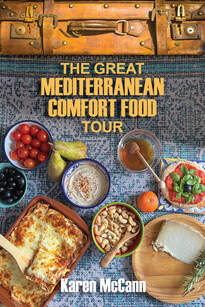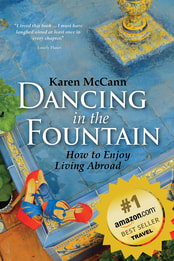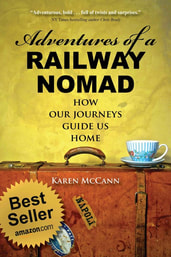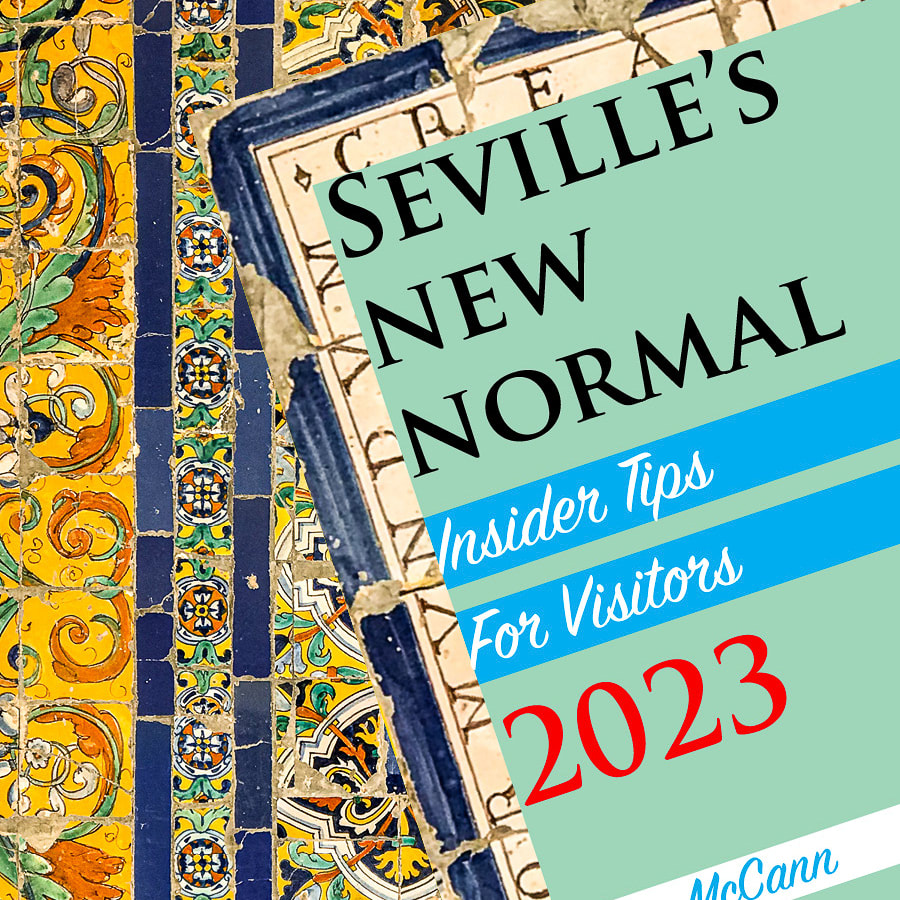|
“Fine, go ahead,” Rich said, shuddering. “Just don’t expect me to eat any of it.” I had to admit, the labskaus didn’t look particularly appetizing. Usually described as a bright purple meat purée colored with beets, mine appeared more of a tired mauve; even the sunny-side-up egg topper couldn’t make it appear anything but drab. However, I refused to be put off by appearances. Medieval German sailors lived on this hearty dish made from minced and boiled salted beef, potatoes, onions, and lard. And here at the Schiffergesellschaft — the ancient hall of the maritime guilds in the port city of Lübeck, Germany — I’d heard they served the best. I fortified myself with a swig of beer and dug in. Imagine corned beef hash made with over-boiled beef, over-mashed potatoes, and loads of lard, seasoned with a dash of beets and a hint of herring. Rich, who loathes beets in any form, could barely look at it, but I have to say, labskaus was far from the worst thing I’ve ever eaten. It was better than Portuguese pig’s ears, for instance, which turned out to be just as rubbery and tasteless as you’d expect. And it didn’t have that peculiar oiliness that makes it so hard for me to swallow the Scots’ beloved haggis. True, labskaus wasn’t quite as good as fried flies, which are as delightfully salty and crunchy — like cocktail peanuts with wings. You don't get that kind of culinary fun with purple boiled beef, but I wouldn’t say it was truly terrible. All the same, I don’t think I’ll be ordering it again soon. OK, ever. In spite of its underwhelming taste and appearance, I rather liked the idea of labskaus. This was the ancient seafaring community’s way of using up odd (possibly questionable) bits of salted meat and root vegetables, creating a filling dish to sustain hungry sailors on voyages throughout the Baltic Sea and beyond. It was as thrifty and practical as the merchants who sent those ships out on ever-longer trading runs. During the thirteenth and fourteenth centuries, Lübeck’s merchants cleverly parlayed a well-placed port into such a prosperous business nexus that they rose to leadership in the Hanseatic League, a vast and powerful trade organization that became the juggernaut of commercial culture in the known world — much like Silicon Valley is today. Since then, Lübeck’s fortunes have waxed and waned, as fortunes so often do. In 1932 the city boldly defied Hitler, refusing to allow him to campaign there; naturally this led to some nasty reprisals later. Toward the end of the war, the Allies bombed Lübeck’s port and devastated the ancient part of the city, but later restorations were so meticulous that the town has been declared a UNESCO World Heritage Site. The restorers mercifully managed to refrain from correcting the off-kilter, listing, crooked walls of the original medieval houses, warehouses, and towers in the town center, and combined with the conical black spires rising above the skyline like a gaggle of witch’s hats, this gives the city an endearing resemblance to the illustrations in a child’s book of fairy tales. And that’s what I love about Lübeck. The townspeople never lost sight of the fact that its flaws didn’t diminish the city, they were the very thing that made it marvelous. The charms of imperfection are also part of the appeal of the Lübeck Museum of Theater Puppets, where more than a thousand fantastical figures are displayed in a rabbit warren cobbled together out of half a dozen sixteenth century homes. As you climb up and down spiral staircases and turn unexpected corners, you see plenty of pretty girls and dashing youths, but the most unforgettable characters are the oddballs: grotesque villains, wild-eyed beasts, and scheming crones whose faces are outrageously alive with passion and personality. After wandering, dazzled, through the maze of puppetry exhibits, I said to Rich, “Hungry? I think we owe it to my readers to check out the marzipan.” He responded to this suggestion with considerably more enthusiasm than he’d shown for the labskaus at Schiffergesellschaft. (Go figure.) Legend has it that marzipan, a rich confection of ground almonds and sugar, was invented in Lübeck, possibly as the result of some ancient siege during which all other food supplies were exhausted. Once a delicacy enjoyed by the wealthy, marzipan now enjoys widespread popularity, and local “canditor” Niederegger has a vast downtown emporium on the very spot where marzipan has been sold since the twelfth century. Rated as 100% pure marzipan, Niederegger’s confections are sold worldwide in every shape imaginable, from pigs to dinosaurs to a replica of the city’s famous most landmark, the Holsten Gate. We bought a couple of marzipan hearts covered in dark chocolate and bit into them. Oh. My. God. It was glorious stuff, far better than the American version my parents used to tuck into my Christmas stocking. It was proof that Lübeck’s merchants are still providing, at a reasonable yet profitable price, exactly what the market wants — in this case, something to refresh the palate and chase away the aftertaste of purple puréed beef with hints of beet and herring. WE’RE OFF TO A GOOD START. Our three-month train trip began when we touched down in Paris on June 28 and immediately hopped on a train to Lille, France. Two days later we visited friends in Amsterdam, then continued by rail to Germany. After a brief stopover in Osnabruck, we arrived in Lübeck, on the edge of the Baltic Sea. Since I wrote this post, we’ve taken the ferry north to Sweden, landing in Malmö and continuing on to Stockholm. For more about our continuing adventures, subscribe to this blog and check my Facebook page for updates. YOU MIGHT ALSO ENJOY
18 Comments
Milton Strauss
7/8/2016 05:01:52 pm
Lovely photos, Karen. Remember, medieval sailors also died young ;)
Reply
Karen McCann
7/9/2016 07:08:37 am
Glad you like the photos, Milt. I've recently switched from a "real" camera to using an iPhone 6+, which is great for this kind of shoot-from-the-hip photography. As for the life expectancy, I just checked and back then it was 31.3 years for everybody. There wasn't time to develop fussy eating habits like we foodies have today!
Reply
7/8/2016 05:07:55 pm
How enjoyable in every way to read your stories...food, city architecture and history and your personal likes and feelings. Really wish I was able to do what you're doing!!
Reply
Karen McCann
7/9/2016 07:11:05 am
I'm pleased that you're enjoying the stories of our adventures, Carol. As a world traveler yourself, you know that visiting foreign lands is a zany business. I feel lucky to have the chance to share my stories with everybody.
Reply
7/8/2016 05:12:08 pm
Great post! Keep 'em coming and continued safe and healthy travels to you both. J and J
Reply
Karen McCann
7/9/2016 07:19:41 am
Thanks, Jackie. I was amazed to read about your visit to London; 80 degrees and sunny?? We had rain from Amsterdam all through Germany; it was so damp in Lübeck that I had to finish off the laundry with a hair dryer before I could pack. Oh well, let's hope for sunnier skies ahead. Enjoy your travels and my best to the Scout!
Reply
Love the news! I am already learning a lot such as Portuguese pig’s ears are rubbery and tasteless. He he he. Was there still hair on them? ..., no I suppose the hair was cooked off to get them to the rubbery stage. :-) Thanks for the post. Always enjoy them.
Reply
Karen McCann
7/9/2016 07:23:39 am
Steve, I hadn't even thought about pig ear hair, which must have burned off in the oven; at least we were spared that. NOT my favorite culinary experiment, but hey, any one you can walk away from...
Reply
7/8/2016 06:06:55 pm
We stopped in Lübeck just for an overnight while taking the train up to Norway and absolutely fell in love with the place. Hope we can go back and spend more time.
Reply
Karen McCann
7/9/2016 07:27:28 am
Lübeck is a charmer, isn't it? I found out after we left that there is a marzipan museum on the upper floor of the main Niederegger store. If you go back and manage to find it (there was no hint of it anywhere in the store's signage) I want a full report! And good luck with all your travels! It's always great fun to read about your adventures.
Reply
Dave Foote
7/8/2016 07:08:55 pm
Karen, thanks for such a great post about what is obviously a charming and warmly historic German seaport that I have never had the good fortune to visit.
Reply
Karen McCann
7/9/2016 07:34:33 am
Luckily for me, I have no idea what side of the white sausage equator anyone's pronunciation falls on, including my own with the few words of German I speak. If you can brave the sound of Plattdeutsch, Dave, you'll love Lübeck, and most especially Schiffergesellschaft, which pays homage to all things maritime. Let me know how you like the labskaus!
Reply
Elvira Geselbracht
7/8/2016 10:54:32 pm
Karen and Rich, good to hear that you liked your stay at Lübeck and avoided most of the usual sightseeing places but picked some really nice spots I wasn't even aware of. Just for your information, we met on the train from Amsterdam where my colleague and I and the nice Dutch couple from Hengelo talked all the way long. I hope you liked your short stopover at Osnabrück. Very daring to eat Labskaus, I never tried it and cannot imagine I ever will, I better stick to Marzipan. It is a pity you were on the fly in Germany as it has such beautiful places but I understand that this is not your itinerary this time. Be sure I will follow your steps. I just started your railway book. Safe travels and a good time in Scandinavia and the Baltic States.
Reply
Karen McCann
7/9/2016 07:47:32 am
Rich and I so enjoyed our long railway chat with you, your colleague and the couple from Hengelo. We were commenting to one another afterwards that this kind of unexpected encounter is one of the most delightful aspects of train travel. We appreciated the perspectives and the information. Osnabrück was charming, and we loved the brewery pub near the cathedral that your colleague recommended. Good food, great beer, and a congenial atmosphere. I wish we'd had more time in Germany; you're so right, Elvira, there is much to see. We'll have to organize another visit one of these days.
Reply
Kim Day
7/9/2016 02:41:31 am
I love that you spent what seems like a fair amount of time in Lubeck (I don't know how to make an umlaut on my keyboard). I have spent a good amount of time in Germany but never visited Lubeck;you have added to my never ending list of places I want to visit. And of all modes of transportation I have to admit that trains hold a special place in my heart, right behind slow ocean steamers.
Reply
Karen McCann
7/9/2016 07:55:24 am
I'll let you in on a blogger's secret, Kim: I don't know how to do umlauts either, or most other accents beyond the Spanish ones. I just copy the word and paste it into my sentence. Is that cheating? I'll leave that for future historians to decide. As to Lübeck, it is a wonderful town, and I hope you do have a chance to visit it, preferably by rail or a slow ocean steamer. Such civilized forms of travel!
Reply
8/15/2017 02:19:21 pm
Thank you for the inspiration. We will visit Lûbeck within a week and I'm really looking forward to the visit :)
Reply
Karen McCann
8/16/2017 02:00:32 am
Glad to know you found this information helpful, Jesper. Enjoy Lûbeck and if you try the labskaus, let me know what you think of it!
Reply
Leave a Reply. |
This blog is a promotion-free zone.
As my regular readers know, I never get free or discounted goods or services for mentioning anything on this blog (or anywhere else). I only write about things I find interesting and/or useful. I'm an American travel writer living in California and Seville, Spain. I travel the world seeking eccentric people, quirky places, and outrageously delicious food so I can have the fun of writing about them here.
My current project is OUT TO LUNCH IN SAN FRANCISCO. Don't miss out! SIGN UP HERE to be notified when I publish new posts. Planning a trip?
Use the search box below to find out about other places I've written about. Winner of the 2023 Firebird Book Award for Travel
#1 Amazon Bestseller in Tourist Destinations, Travel Tips, Gastronomy Essays, and Senior Travel
BLOG ARCHIVES
July 2024
CATEGORIES
All
|
